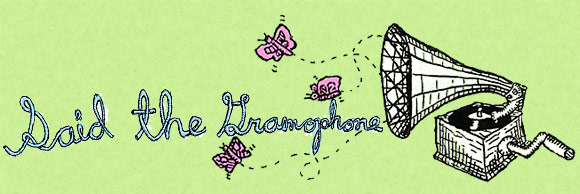1. "Kill v Maim" is kind of weird. Like most of the things I end up loving the most, I didn't think much the first few times I encountered it. It sounded to me like just parts piled on parts; something about the pitched-up vocals, synths and skipping beat, metal on metal didn't quite click. The way Grimes' voice flips so fast between low hurl and scratched-out scream. The scorch-and-tatter speed of it.
2. I went to see Jessica Hopper give a reading on Wednesday and it was inspiring in the best way, smart, no side-steps. She talked about intersectionality, about who she writes for, about how early on in her career she wrote "SELF-DOUBT IS POISONOUS" on an index card in glitter glue and tacked it up beside her desk just so that she'd remember. It felt good to listen.
At the end of the talk there was a Q&A, and someone asked how she dealt with the problem of explaining misogyny in music to the men she met, what she'd recommend for someone trying to figure out the best way. She sighed real hard. After twenty years of trying, she said, she was becoming more and more convinced that the only way to communicate the truth of some of the most basic experiences women have in music - as fans, as writers, as artists - was to gather up a few smart straight white men who Get It, and ask them to explain it all to their peers. No one's listening to us, she said. We know no one listens.
3. In her review of Art Angels Hopper mentions this song in particular twice. At first it is blown-out, bright, anxious; later it has a fierce anger, a casual misandry. Reading through it the first time, I wrote those last two phrases on the notepad I keep on my desk without even thinking. A reflex. My joke is always, business card, author bio, tinder profile.
4. "Oblivion," Grimes's best-known song pre-Art Angels, is about an assault. In the lyrics she's neither the victim or the attacker, or maybe she's both - looming even as she checks over her shoulder, every line. Someone could break your neck, coming up behind you always coming and you'd never have a clue. Synths that are just lovely enough to be disturbing, just creepy enough to be comforting. See you on a dark night. When you feel trapped, there is a great deal of quiet, weird power in switching sides. Slipping between subject and object.
5. As for "Kill v. Maim," it finally clicked for me a few days ago. I was on the treadmill at the gym, and it came on, and suddenly I was running so fucking fast. No warning, no reason. I felt like I was trying to escape my own body, like the song was pulling me out of me. Bright and hot and furious.
6. The part of the song I love most isn't the hilarious, weird earworm/mantra are you going to the party are you going to the show?; it's not Boucher insisting she won't behave, nor is it the way her voice's rapidcycling speed and pitch add their own thesis-worthy set of subtextual meanings to the whole deal. It's not the cheerleader chorus. It's the cascade that comes after. 'Cause I'm only a man, and I do what I can. Half-mocking, half-earnest. Subject, object, all at once.
7. Hopper mentioned in her talk that she'd been proud of her Grimes review, which praises Claire Boucher highly for being a feminist pop auteur who does everything herself, until she realized something. After I wrote it, she said, I started thinking, well then what am I saying about women who don't do all of that stuff themselves?
One of the most difficult and necessary parts of becoming a good artist, writer or person, is learning to balance the belief that SELF-DOUBT IS POISON with the understanding that you are probably wrong about a lot of shit and that you need to be ready and willing to listen, to change your mind all the time.
It's very difficult to do this under any circumstances, but when the world reads you first and foremost as Not A Man, the prospect of trying to disentangle the mess of intent and implication that defines every single interaction you have with the outside world can be so exhausting that sometimes, instead of going to that show or talking to that stranger or pitching to that editor or putting that song up or answering that message you're just like, fuck it, where's my sound-proof chamber?
8. I have spent countless hours of my life in classrooms, offices, bars, beds, trying to describe this double bind to men who will never be interested in understanding it. The second you're aware of your difference, every interaction grows this new labyrinthine aspect: Am I being treated like this because this person doesn't like me, or because he doesn't like what I am? How do I sound out the difference? Double down or back off, lean into it or walk away? Do I believe myself? How angry do I need to be, or pretend I'm not, to get through this whole thing unscathed? To be okay? To be good?
When Hopper said that thing about how no one listens to women, you could hear this little shudder of disappointment and unhappiness shifting through the room. I felt those things too. But there was something else. The idea that I could be forgiven for turning away from the work of trying to make a certain type of man listen to me, for turning a little further toward other kinds of work, felt good. Like permission. A kind of relief I wish I didn't want.
[buy Art Angels + The First Collection of Criticism by a Living Female Rock Critic]
Posted by Emma at November 22, 2015 7:45 PMwonderfully well-said, emma. thanks for sharing
Posted by coel at November 22, 2015 10:35 PMbeautiful. thank you.
Posted by josh at November 24, 2015 6:45 PMBeautifully said. I needed to hear this today.
Posted by michelle at December 5, 2015 5:02 PMOh my gosh, yes, this. THIS. Thank you for putting it in words.
Posted by Lindsey at December 29, 2015 12:16 PM



